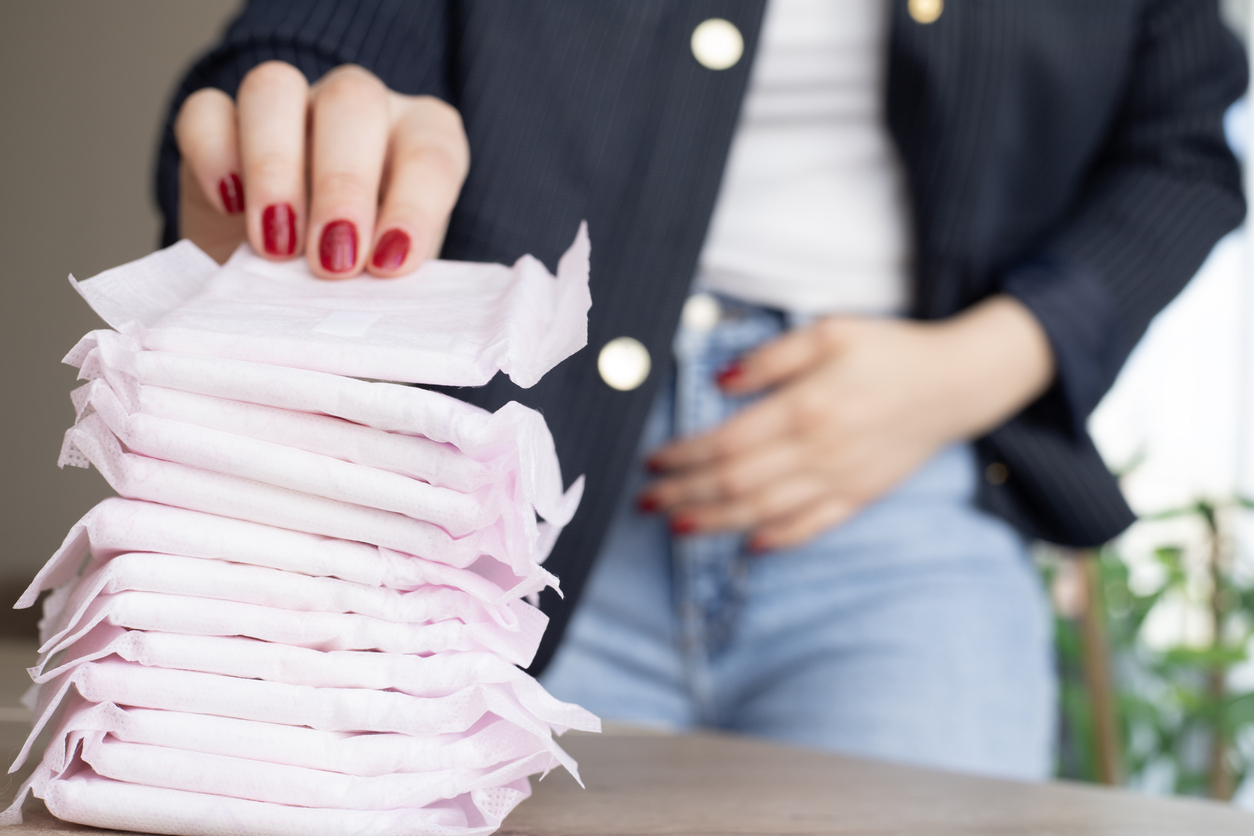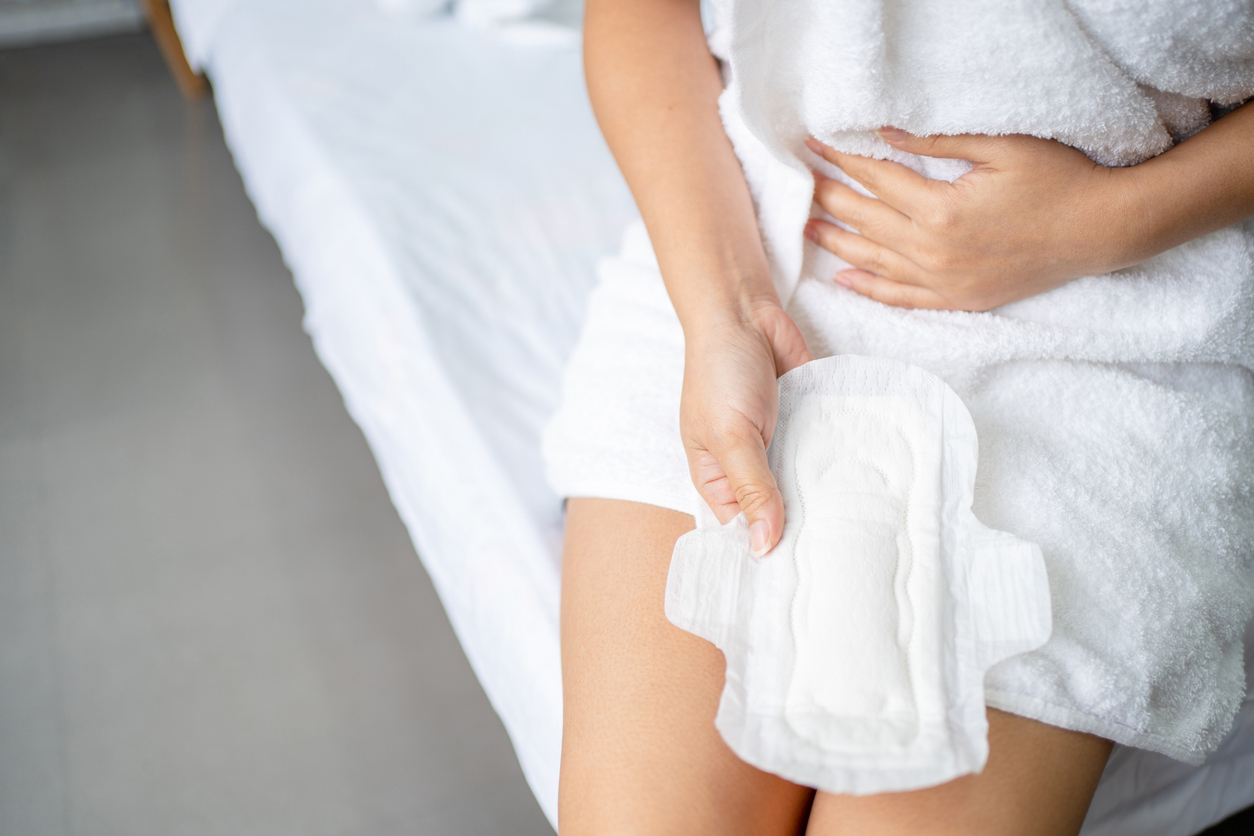At first, it might seem normal. You're changing your pad or tampon every hour, maybe passing a few clots, feeling more drained than usual. You might brush it off as just a "bad period."
But if your flow is regularly overwhelming your menstrual products, soaking through clothes, or leaving you exhausted, it’s time to check in with your body. Losing too much blood during your period is more than just annoying — it can signal a health issue worth investigating.

Can you lose too much blood on your period?
Yes, it’s absolutely possible to lose too much blood during your period — and it happens more often than people realize. The medical term for heavy menstrual bleeding is menorrhagia, and it affects an estimated 1 in 5 people who menstruate, according to the CDC.
While blood loss varies from person to person, the average period involves around 30 to 40 milliliters of blood — roughly 2 to 3 tablespoons. More than 80 milliliters (about 5 tablespoons) of blood loss is considered excessive and could impact your health, especially over time.
But most of us aren't measuring our flow in milliliters — we're judging it by how many pads, tampons, or menstrual cups we go through. And that’s okay. Your lived experience matters just as much as the numbers.
How do I tell if I've lost too much blood?
It’s not like anyone’s walking around with a measuring cup in their underwear. So, how do you know if your period is too heavy?
Here are some everyday signs that your flow may be heavier than normal:
- You soak through a pad or tampon every hour for several hours in a row
- You need to double up on products (like using a tampon and a pad at the same time)
- You need to change menstrual products during the night
- You pass blood clots larger than a quarter (about 2.5 cm)
- Your period lasts longer than 7 days
- You feel tired, lightheaded, or short of breath during your period.
If any of those sound familiar, you're not alone. In a Rescripted community poll, 23% of respondents said they experience heavy flow or prolonged bleeding, while 22% said they sometimes pass clots — and 1% said they pass clots multiple times a day.

What are the warning signs of excessive bleeding?
Heavy periods look different for everyone, but there are some clear signals your body may be sending you. These aren’t just random period annoyances—they’re important signs that something deeper could be going on. Here’s how to know if your bleeding is more than just “a rough cycle.”
1. Frequent leaking or overflow
If you're leaking through a pad, tampon, or cup every hour (or sooner), especially for multiple days, that’s more than a "heavy day."
If you're leaking through a pad, tampon, or menstrual cup every hour or less, and this happens for several hours in a row, it’s a major red flag. This kind of bleeding isn’t just heavy — it’s excessive. Most people can go 3 to 4 hours between changes on heavier days, so needing to change every hour or less suggests your flow is unusually heavy.
This might mean:
- Soaking through clothes
- Waking up in blood-soaked sheets, despite wearing some sort of period product
- Needing to use both a tampon and a pad just to get through a meeting or a short outing
2. Passing large clots
Some clotting is totally normal — especially on your heaviest day. But when clots are bigger than a quarter (around 2.5cm or 1 inch), it may be a sign your uterus is shedding its lining too quickly for your body to keep up. The result? Blood pools and clots before it exits the body.
If you're passing several large clots regularly, especially if it’s accompanied by cramps or sharp pelvic pain, that’s not something to ignore. It could indicate:
- Hormonal imbalances
- Fibroids or polyps
- Adenomyosis or other uterine conditions
3. Feeling physically drained
We all expect to feel a little sluggish during our periods. Hormonal shifts can mess with your sleep, mood, and energy. But if you're feeling extremely tired, weak, or dizzy, that’s a different story.
This kind of fatigue could be linked to iron-deficiency anemia, a common side effect of chronic heavy bleeding. When the body loses more red blood cells than it can replace, it leads to low iron levels — and symptoms like:
- Fatigue or brain fog
- Pale skin or lips
- Rapid heartbeat
- Shortness of breath
- Cold hands and feet
If you’re constantly dragging yourself through the day or needing naps just to survive your period, it’s time to get your iron levels checked with a simple blood test.
4. Pain and pressure
Let’s be real: period cramps are nobody’s idea of fun. But there’s a difference between manageable discomfort and intense, debilitating pain — especially when combined with excessive bleeding.
Sharp, stabbing, or pressure-like pain (especially in the lower abdomen or back) can point to conditions like:
- Uterine fibroids: Benign growths that increase bleeding and cause pressure
- Endometriosis: When uterine-like tissue grows outside the uterus, causing pain and inflammation
- Adenomyosis: When tissue from the lining of the uterus grows into its muscle wall
5. Missing work, school, or activities
If your period regularly causes you to call in sick, cancel plans, or avoid leaving the house, that's not a normal part of menstruation — it’s a quality of life issue. Full stop.
You might find yourself:
- Planning life around your cycle (“I can’t go on that trip; I’ll be on my period.”)
- Turning down social plans or dates because of a heavy flow or fear of leaking
- Staying near a bathroom or bringing backup clothes “just in case”
- Feeling emotionally overwhelmed and isolated during every cycle
While it’s easy to internalize this and blame yourself for being “dramatic” or “too sensitive,” your body is trying to tell you something. You’re not overreacting. Heavy bleeding that interferes with your ability to live your life deserves to be addressed — not dismissed.

When is a period dangerously heavy?
A period becomes dangerously heavy when it puts your health at risk—especially due to blood loss or its impact on your iron levels, energy, and ability to function normally.
Here’s when it’s best to talk to your doctor:
- You’re bleeding through more than one pad or tampon per hour for 4+ hours straight.
- You have to change products overnight, multiple times.
- You’re feeling dizzy, weak, or faint and can’t stand or walk properly.
- You pass multiple large clots daily for several days.
- Your period lasts longer than 7 days, regularly.
- You notice symptoms of shock, like confusion, pale skin, rapid breathing, or a fast heartbeat.
- You’re experiencing severe abdominal or pelvic pain that’s new or worsening.
Losing too much blood for just one cycle might not be that serious — but chronic heavy periods can slowly deplete your iron stores, weaken your immune system, and affect your mood, memory, and sleep.
What do doctors do if your period is too heavy?
If your periods are consistently heavy, your healthcare provider will usually start by asking about your cycle history, symptoms, and general health. They may:
- Order blood tests to check for anemia or clotting issues.
- Run a pelvic ultrasound to check for fibroids, polyps, or other abnormalities.
- Suggest hormonal testing to check for imbalances like PCOS or thyroid issues.
- Do a biopsy in rare cases to rule out endometrial hyperplasia or cancer (especially over age 35).

Treating heavy periods: You don’t just have to “deal with it”
Here’s the truth: just because heavy periods are common doesn’t mean they’re normal — or something you should have to power through every month with a heat pad and gritted teeth. If your period is draining you, disrupting your life, or making you feel like you’re bleeding out every cycle, there are treatment options.
Treatment for heavy menstrual bleeding will depend on what’s behind it. But here are some of the most common and effective options your doctor might explore:
1. Iron supplements
If you’re dealing with heavy bleeding, you might also be dealing with low iron — even if your doctor hasn’t brought it up yet. Iron supplements can help prevent or treat iron-deficiency anemia, which can cause symptoms like fatigue, dizziness, brain fog, and shortness of breath. A simple blood test can confirm if your iron or ferritin levels are low.
2. Hormonal birth control
Hormonal contraceptives like pills, patches, vaginal rings, hormonal IUDs, or injections can reduce how much you bleed by thinning the uterine lining or stopping ovulation altogether. Some people love this option. Others don't vibe with hormonal changes or side effects — and that’s okay. It’s about finding what feels right for you.
3. Non-hormonal medication
Not into hormonal options? That’s valid. Medications like tranexamic acid (which helps your blood clot more efficiently) can significantly reduce bleeding during your period. And over-the-counter NSAIDs like ibuprofen can not only help with cramps but also reduce blood loss, too.
4. Surgical options
If other treatments aren’t working — or you’ve got something structural like fibroids or polyps causing your heavy flow — your doctor may suggest a procedure. These can range from:
- Endometrial ablation (removing the lining of the uterus)
- Hysteroscopy (removing polyps or fibroids)
- Myomectomy (removing fibroids while preserving the uterus)
- In more severe cases, hysterectomy (removal of the uterus)
These are usually last-resort options when nothing else has helped and your quality of life is seriously affected.

What causes heavy periods in the first place?
Heavy periods can be caused by a range of things. Some of the most common include:
- Hormonal imbalances (like low progesterone)
- Fibroids or polyps (non-cancerous growths in the uterus)
- Endometriosis or adenomyosis
- Bleeding disorders (like von Willebrand disease)
- Thyroid problems
- Certain medications, like blood thinners
- Perimenopause (periods can get heavier and more erratic)
Sometimes, no clear cause is found. But that doesn’t mean your symptoms aren’t real — or treatable.

You're not alone (and you're not overreacting)
If your period has ever made you feel like you’re bleeding out, exhausted, or trapped at home, you’re not imagining it — and you’re definitely not alone. Heavy periods are incredibly common, but they’re also widely underdiagnosed, in part because so many people are told to just "deal with it."
In the Rescripted community, 23% of respondents reported heavy or prolonged bleeding — and 50% said they use 5 or more pads or tampons a day. That’s not just inconvenient. It’s something worth speaking up about.
Ultimately, there’s no gold standard for the “perfect period,” but there is a line where heavy becomes too heavy. If your period is interfering with your life, your energy, or your health — it matters. And there are solutions.
You deserve to bleed without suffering. You deserve answers. And you deserve to be heard.
Tassia O'Callaghan is an experienced content writer and strategist, having written about a vast range of topics from chemical regulations to parenting, for brands like Peanut App Ltd, Scary Mommy, Tally Workspace, and Fertility Mapper. She's an advocate for realistic sustainable living, supporting small businesses (author of A-Z of Marketing for Small Businesses), and equity across all walks of life. Follow her on LinkedIn or TikTok, or see more of her work on Authory or her website.




.jpg)



.webp)

.jpg)








